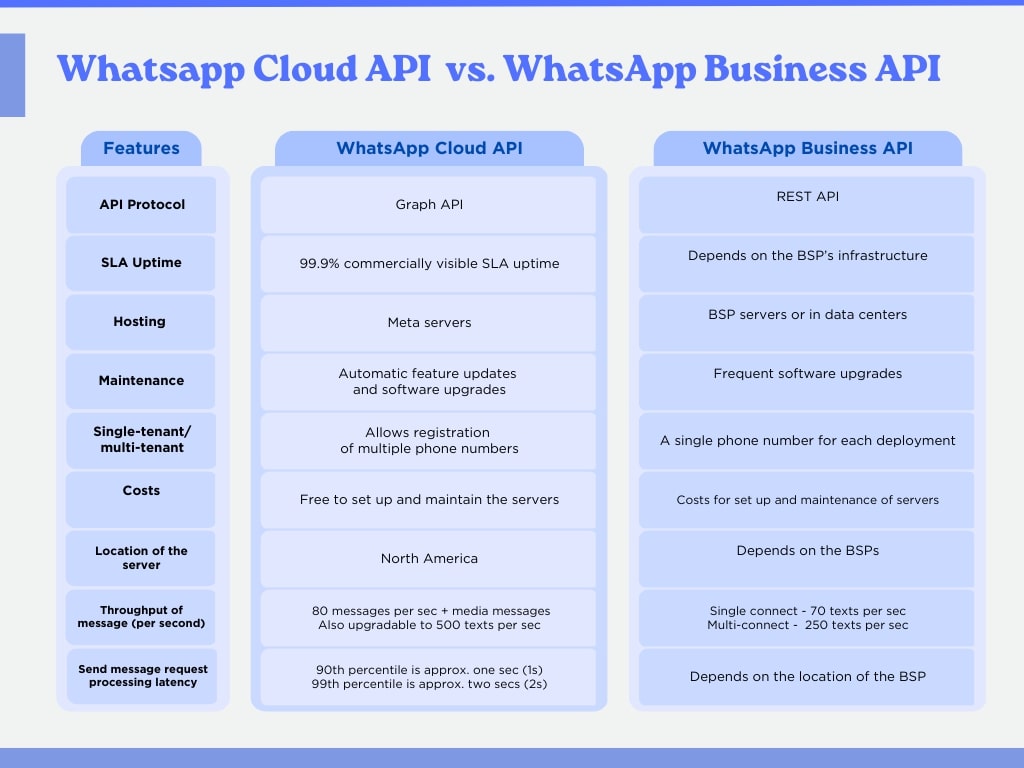WhatsApp Cloud API
In the realm of instant messaging, WhatsApp has emerged as the preferred platform for businesses to engage with their clientele. The recent introduction of WhatsApp Cloud APIs has elevated the possibilities for businesses to enhance their interactions on WhatsApp. This article delves into the evolution of WhatsApp, exploring the rationale behind the development of APIs.

WhatsApp boasts over 2 billion users globally, with more than 90% of chat app users favoring it in over 10 nations. In India alone, 487 million individuals use WhatsApp monthly, constituting nearly 25% of the app’s worldwide user base. The app boasts an impressive 98% average open rate and a click-through rate ranging between 40% and 45%.
Recognizing the immense potential for businesses to connect with customers, WhatsApp introduced the WhatsApp Business app in 2009, providing a direct medium for businesses to engage with their clientele. Despite its popularity, the WhatsApp Business app had limitations, particularly in terms of scalability and advanced functionalities.
To address these limitations, WhatsApp Business APIs were launched by Facebook in August 2018, targeting large businesses with complex needs that surpassed the capabilities of the mobile app. Business Solution Providers (BSPs) acted as intermediaries, reselling these APIs to large companies. While this benefited larger corporations, small businesses grappled with challenges such as high costs, complex tools, indirect API access, and billing complexities through BSPs.
In May 2022, Facebook introduced the WhatsApp Cloud API, a transformative solution that allowed businesses of any size to directly access the APIs without relying on BSPs. This marked a significant shift, opening up new possibilities for small and medium-sized businesses (SMBs) to leverage WhatsApp for efficient customer engagement.
The WhatsApp Cloud API, hosted in the cloud and officially provided by WhatsApp, enables businesses and developers to programmatically send and receive WhatsApp messages. Unlike the period before May 2022, businesses can now use these APIs without the need for BSPs, eliminating exorbitant costs and extra markups.
The challenges associated with BSPs, including high pricing, extra markup, pre-purchase of credits, cluttered tools, and indirect API access, prompted the emergence of WhatsApp Cloud APIs as a lifeline for SMBs. This new solution enables businesses to connect with their customers more effectively than the WhatsApp Business mobile app.
The benefits of the WhatsApp Cloud API are numerous, including enhanced customer engagement through personalized messages, improved response times with automated message responses, increased efficiency via seamless integration with existing business systems, and cost-effective communication with a pay-per-conversation pricing model.
- Broadcasting bulk promotional messages
- Sending personalized marketing campaigns
- Setting up automated notifications and updates for timely communication
- Reducing abandoned carts on e-commerce stores by sending timely reminders
- Automating reminders for filling out applications, such as for financial services or online courses
- Collecting real-time customer feedback for valuable insights
- Incentivizing customers choosing cash on delivery (COD) as a payment method
- Upselling and cross-selling
- Enhancing user engagement with interactive messages and CTAs
- And more more
The versatility of the WhatsApp Cloud API makes it suitable for businesses of all sizes and industries. It can be seamlessly integrated into various marketing strategies, offering benefits such as broadcasting bulk promotional messages, sending personalized campaigns, setting up automated notifications, reducing abandoned carts, collecting real-time customer feedback, and more.
To implement WhatsApp Cloud APIs, businesses have three options.
Option 1 – Develop an In-House Tool
Consider hiring developers to integrate the APIs into your website or CRM tool using custom coding or creating your interface for contact uploading and sending bulk messages.
This entails building everything from scratch, a potentially costly and time-consuming endeavor for most businesses. Alternatively, an easier approach is to utilize a pre-built tool designed for API use.
Option 2 – Engage a Business Solutions Provider (BSP)
Opt for one of the numerous Business Solutions Providers (BSPs) in the market, official partners of WhatsApp offering APIs. Utilize their tool for sending and receiving WhatsApp messages, eliminating the need to construct your tool.
However, working with BSPs has a significant drawback – they act as intermediaries, charging high monthly fees in addition to 10-15% of WhatsApp’s standard per-conversation pricing.
Option 3 – Subscribe to XpressBot!
Unlike BSPs, XpressBot is not a Business Solutions Provider. We provide a straightforward tool built on top of WhatsApp Cloud APIs, available for use with your API credentials.
You enjoy complete control over setup, usage, and billing, with the added advantage of lower costs compared to BSPs. We charge a nominal fee for utilizing our tool while delivering all the features offered by a BSP.
The most significant benefit of all is that we do not impose extra markups on top of WhatsApp’s standard pricing.
In conclusion, XpressBot serves as a comprehensive WhatsApp marketing tool, seamlessly integrating with WhatsApp Cloud APIs. This solution empowers businesses with efficient communication capabilities, including bulk messaging, transactional notifications, and an intuitive dashboard, all without the extra markups seen with traditional BSPs.
